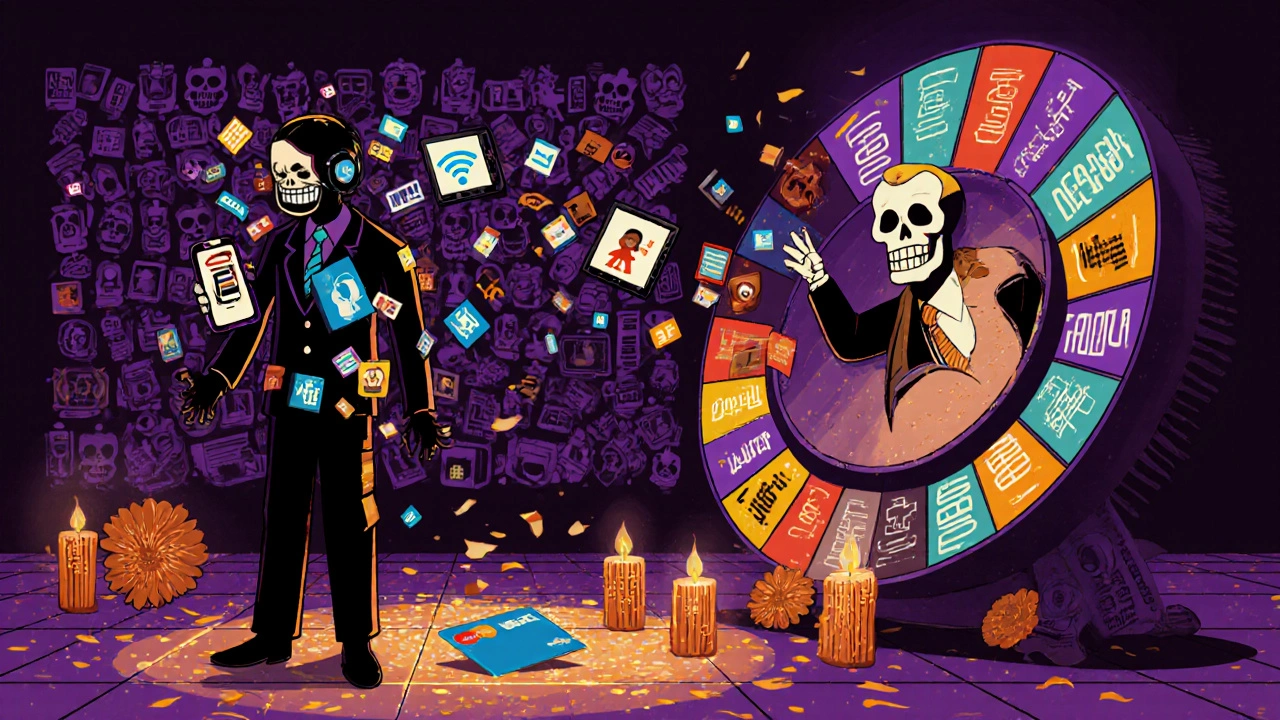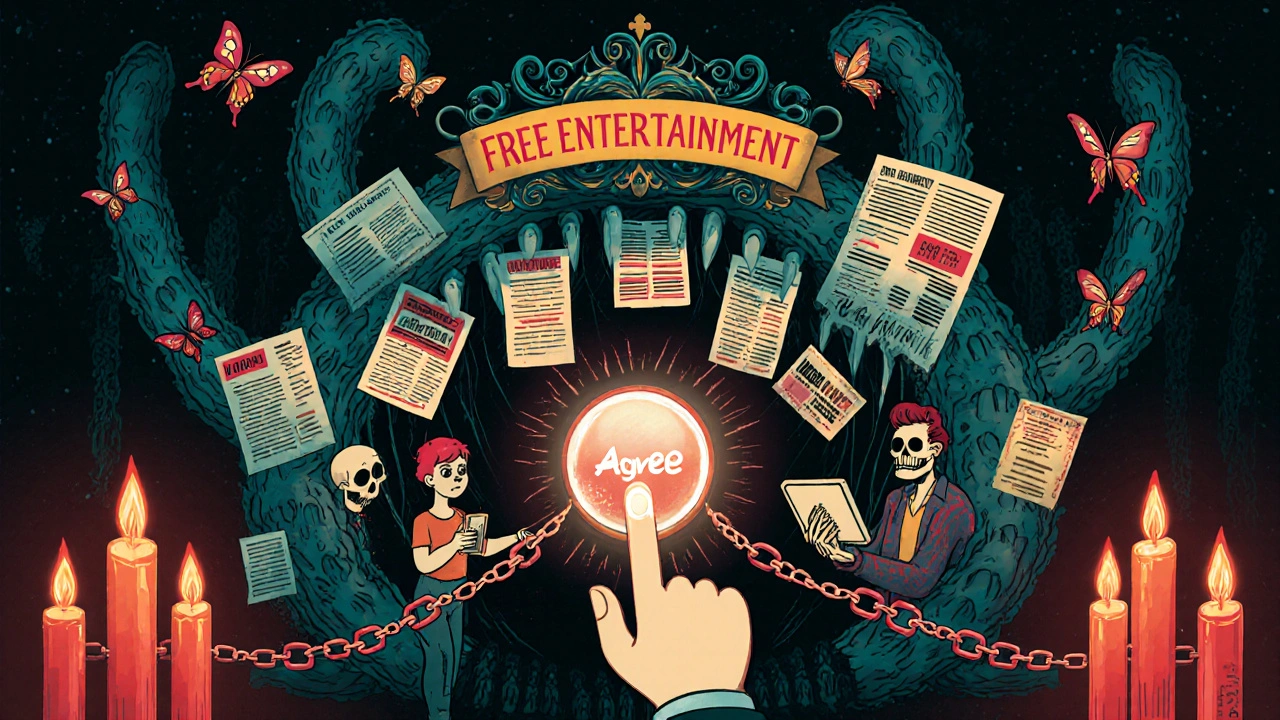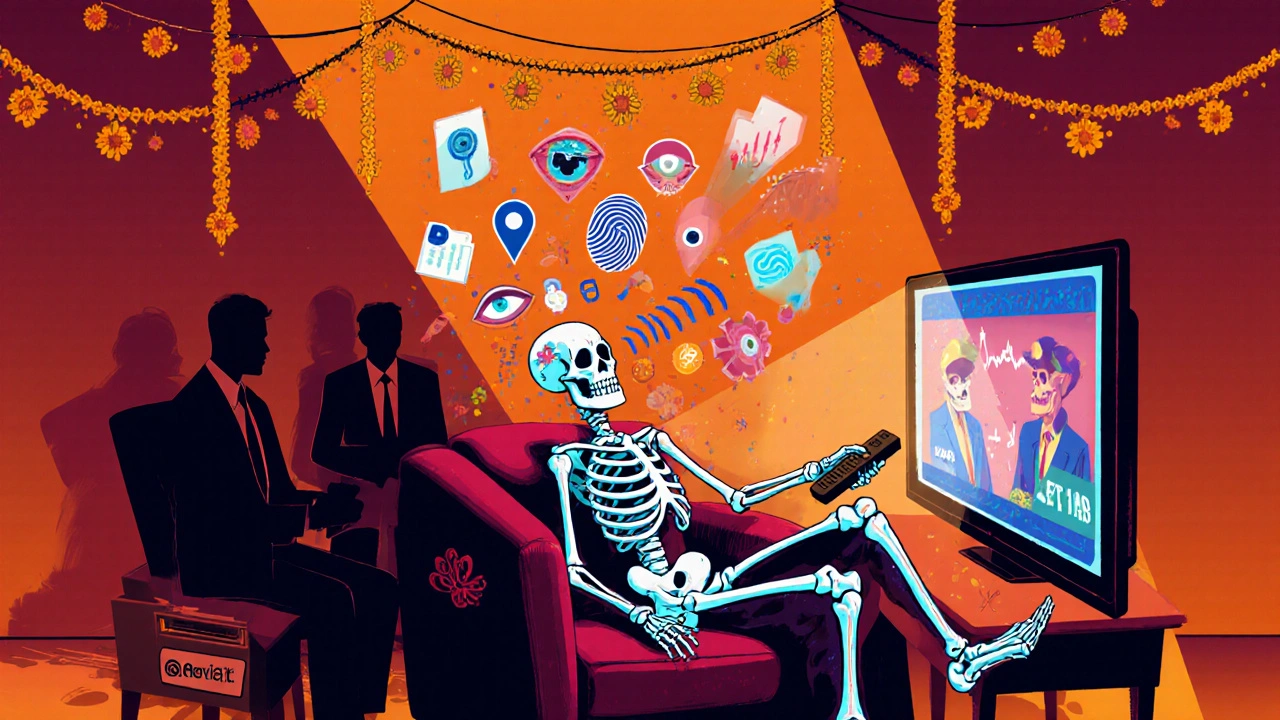You click play on your favorite show. No credit card. No monthly fee. Just endless entertainment. Sounds like a gift, right? But here’s the truth: you’re not the customer. You’re the product.
What You’re Really Paying For
Free streaming platforms don’t make money from you watching. They make money from what they learn while you watch. Every pause, every rewind, every time you skip a trailer-it’s all logged, analyzed, and sold. Companies like Tubi, Pluto TV, and Crackle don’t charge you because they don’t need to. They get paid by advertisers who want to know exactly who you are, what you like, and what you’re likely to buy next.
In 2024, the average free streaming user generated over 2,300 data points per month. That’s not just what you watched. It’s your device type, your location, your Wi-Fi network, how long you stared at the screen before skipping, even the time of day you paused. All of it feeds into a profile that’s more detailed than what your best friend knows about you.
How Your Data Gets Tracked
It starts with the app. When you install a free streaming service, you agree to a terms-of-service document that’s longer than most novels-and just as unreadable. Hidden in there are permissions for tracking pixels, device fingerprinting, and behavioral analytics. These tools don’t just record what you watch. They map your habits across apps, websites, and even smart TVs.
For example, if you binge-watch crime dramas at 11 p.m. on a Tuesday, the system flags you as a late-night viewer with high engagement. That profile gets bundled with thousands of others and sold to ad networks. Then, a week later, you start seeing ads for security systems, true-crime podcasts, and premium VPNs-not because you searched for them, but because your behavior was predicted.
Some services even use audio fingerprinting. Yes, your phone’s microphone might be listening-not to respond to voice commands, but to detect what’s playing on your TV. If your show is on while you’re scrolling Instagram, they can link your phone activity to your viewing habits. That’s not a bug. That’s the business model.
Who’s Buying Your Data?
It’s not just advertisers. Data brokers like Acxiom, Experian, and Oracle Data Cloud buy and sell streaming profiles in bulk. These companies don’t care if you’re watching romantic comedies or war documentaries. They care about the patterns. They combine your streaming behavior with your credit history, grocery purchases, and even your car’s GPS data to build a full behavioral portrait.
One leaked internal document from a major free streaming platform showed that a user’s profile could be sold to up to 17 different buyers in a single month. Each buyer adds another layer: insurance companies use it to assess risk, political groups target voters, and even recruiters screen job applicants based on their entertainment choices.
And here’s the kicker: you never consented to any of this. The “agree” button you clicked? It doesn’t say, “We will sell your viewing habits to data brokers who may use them to influence your insurance rates.” It says, “We may collect information to improve your experience.” That’s not transparency. It’s obfuscation.

The Privacy Gap Between Free and Paid
Compare that to Netflix or Apple TV+. They charge you $15 a month. In return, they promise not to sell your data to third parties. They still track what you watch-but only to recommend more shows. No ads. No brokers. No cross-app profiling.
It’s a simple trade-off: pay for privacy, or give it away for free. And most people don’t realize they’re making that choice every time they open a free app.
A 2025 study by the University of Auckland’s Digital Ethics Lab found that 78% of users who used free streaming services believed their data was “safe” or “not collected.” Only 12% knew their viewing habits were being sold. The rest? They thought ads were just targeted based on their search history. They had no idea their TV was part of a surveillance network.
What You Can Do
You don’t have to quit streaming. But you do need to be smarter about how you use it.
- Use a VPN-not just for geo-unblocking, but to mask your IP address. Free services can’t track your location as easily if your traffic is routed through a different country.
- Disable personalized ads-on Android, go to Settings > Google > Ads. On iOS, go to Settings > Privacy > Apple Advertising. Turn on “Limit Ad Tracking.” It won’t stop tracking, but it reduces how much data is shared.
- Use ad blockers-extensions like uBlock Origin can block tracking scripts on browser-based streaming sites. They won’t work on apps, but they help on desktop.
- Stick to ad-free platforms-if you watch more than 10 hours a week, paying $10-$15 for a service like Netflix or Disney+ saves you more than money. It saves your privacy.
- Check permissions-go into your streaming app’s settings. Look for “Data Collection,” “Analytics,” or “Advertising.” Turn off anything that says “personalized content” or “third-party sharing.”
None of this is foolproof. But it’s a start. The goal isn’t to be invisible-it’s to make it harder for them to build a detailed picture of you.

Why This Matters Beyond Ads
This isn’t just about getting spam emails or seeing ads for things you didn’t ask for. It’s about control. When your entertainment habits are turned into data points, you lose the right to be anonymous. You become predictable. And predictability is a tool-used by marketers, yes, but also by governments, insurers, and employers.
In New Zealand, there’s no law that stops a company from using your streaming data to deny you life insurance. In the U.S., some insurers already do. In China, streaming behavior is tied to social credit scores. Even here, the data is being collected. The question isn’t whether it’s being used against you-it’s when.
Free streaming isn’t free. It’s a transaction: your attention, your habits, your identity-for content. And most people don’t even realize they’ve signed the contract.
The Real Choice
You can keep watching free shows. But know this: every minute you spend on a free platform, you’re handing over pieces of yourself. Not to a company. To a system designed to turn your life into a commodity.
There’s no shame in wanting entertainment without paying. But there’s wisdom in knowing what you’re giving up.
Next time you open a free streaming app, pause for five seconds. Ask yourself: Is this show worth my privacy?
Are free streaming services legal?
Yes, most free streaming services are legal-they just operate under different business models. Unlike paid services that license content directly from studios, free platforms often rely on ad-supported licensing deals or public domain content. But while the content may be legal, the way they collect and sell your data often walks a gray line. In New Zealand, the Privacy Act 2020 requires transparency about data collection, but enforcement is weak. Many services bury their data practices in long legal terms, making it hard to prove violations.
Can I get hacked through a free streaming app?
Not directly from the stream itself, but yes-through the app’s security flaws. Many free streaming apps have poor code, outdated libraries, or unsecured APIs. In 2024, researchers found that over 40% of free streaming apps on Android had vulnerabilities that could let attackers access device identifiers, location data, or even control the camera. The risk is higher on older devices or those without automatic updates. Always keep your apps updated and avoid downloading apps from third-party stores.
Do free streaming services track me even when I’m not watching?
Yes. Many apps continue to run background processes that send usage data, even when the screen is off. Some collect Wi-Fi network names, nearby Bluetooth devices, and app usage patterns across your phone. This is called “passive tracking.” It helps build a profile of your daily routines. To stop it, go to your phone’s settings and disable background app refresh for streaming apps. On iOS, it’s under Settings > General > Background App Refresh. On Android, it’s under Apps > [App Name] > Battery > Background restriction.
Is there a free streaming service that doesn’t track me?
Not really. Even public broadcasters like PBS or the BBC, which offer free content, use analytics tools to understand viewership. The only services that don’t track you are those that don’t rely on ads-and those almost always cost money. Some open-source platforms like Plex (self-hosted) or Kodi (with no add-ons) can be privacy-friendly if you set them up correctly. But they require technical effort and don’t offer mainstream content. For most people, the trade-off is clear: no tracking means paying.
Should I avoid free streaming altogether?
Not necessarily. If you watch occasionally and don’t mind targeted ads, free streaming is fine. But if you watch hours a week, care about your digital footprint, or want to avoid being profiled by advertisers and data brokers, it’s worth switching to a paid service. Think of it like buying organic food: you don’t have to, but if you know what’s in it, you might choose differently. Paying $10 a month for privacy is cheaper than paying with your personal data every day.


